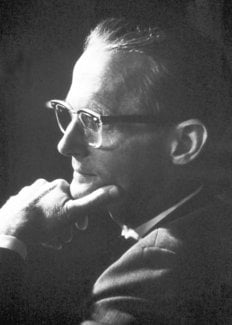William Lipscomb
Biographical

Although born in Cleveland, Ohio, USA, on December 9, 1919, I moved to Kentucky in 1920, and lived in Lexington through my university years. After my bachelors degree at the University of Kentucky, I entered graduate school at the California Institute of Technology in 1941, at first in physics. Under the influence of Linus Pauling, I returned to chemistry in early 1942. From then until the end of 1945 I was involved in research and development related to the war. After completion of the Ph.D., I joined the faculty of the University of Minnesota in 1946, and moved to Harvard University in 1959. Harvard’s recognitions include the Abbott and James Lawrence Professorship in 1971, and the George Ledlie Prize in 1971.
The early research in borane chemistry is best summarized in my book “Boron Hydrides” (W.A. Benjamin, Inc., 1963), although most of this and late work is in several scientific journals. Since about 1960, my research interests have also been concerned with the relationship between three-dimensional structures of enzymes and how they catalyze reactions or how they are regulated by allosteric transformations.
Besides memberships in various scientific societies, I have received the Bausch and Lomb honorary science award in 1937; and, from the American Chemical Society, the Award for Distinguished Service in the Advancement of Inorganic Chemistry, and the Peter Debye Award in Physical Chemistry. Local sections of this Society have given the Harrison Howe Award and Remsen Award. The University of Kentucky presented to me the Sullivan Medallion in 1941, the Distinguished Alumni Centennial Award in 1965, and an honorary Doctor of Science degree in 1963. A Doctor Honoris Causa was awarded by the University of Munich in 1976. I am a member of the National Academy of Sciences U.S.A. and of the American Academy of Arts and Sciences, and a foreign member of the Royal Netherlands Academy of Sciences and Letters.
My other activities include tennis and classical chamber music as a performing clarinetist.
William Lipscomb died on April 14, 2011.
This autobiography/biography was written at the time of the award and later published in the book series Les Prix Nobel/ Nobel Lectures/The Nobel Prizes. The information is sometimes updated with an addendum submitted by the Laureate.
Nobel Prizes and laureates
Six prizes were awarded for achievements that have conferred the greatest benefit to humankind. The 14 laureates' work and discoveries range from quantum tunnelling to promoting democratic rights.
See them all presented here.
